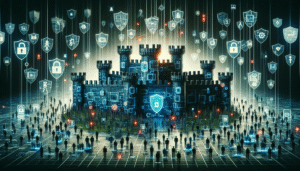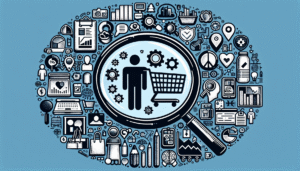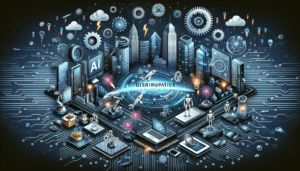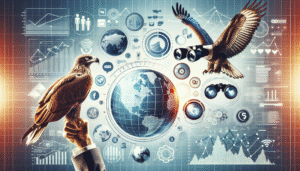
The Expanding Universe of Artificial Intelligence
Artificial intelligence (AI) is no longer a futuristic fantasy; it’s woven into the fabric of our daily lives. From the algorithms that curate our social media feeds to the voice assistants that answer our queries, AI’s influence is pervasive and growing exponentially. This raises a crucial question: what does the future of AI hold?
AI-Powered Automation: Reshaping the Workforce
One of the most significant impacts of AI will be on the labor market. AI-driven automation is poised to transform industries, automating repetitive tasks and increasing efficiency. While concerns about job displacement are valid, AI also presents opportunities for new roles focused on AI development, maintenance, and oversight. The future workforce will likely require a blend of technical skills and adaptability to collaborate with AI systems effectively. Reskilling and upskilling initiatives will become essential to bridge the gap and equip individuals for the changing job landscape.
The Rise of Personalized Experiences
AI’s ability to analyze vast datasets allows for hyper-personalization across various sectors. In e-commerce, AI algorithms can predict consumer preferences, offering tailored product recommendations and targeted advertising. In healthcare, AI can analyze patient data to create personalized treatment plans and predict potential health risks. This trend towards personalization will continue to intensify, leading to more customized experiences in areas like education, entertainment, and travel.
AI in Healthcare: A New Era of Medicine
AI is revolutionizing healthcare, from diagnostics to drug discovery. AI-powered imaging tools can detect diseases like cancer with greater accuracy and speed than traditional methods. Machine learning algorithms can analyze patient data to identify patterns and predict outcomes, aiding in preventative care and personalized medicine. AI-driven drug discovery platforms are accelerating the development of new treatments and therapies, potentially leading to breakthroughs in combating complex diseases.
The Ethical Considerations of AI Development
As AI becomes more sophisticated, ethical considerations become paramount. Bias in algorithms, data privacy concerns, and the potential for misuse of AI technology require careful attention. Developing ethical frameworks and regulations for AI development and deployment is crucial to ensure responsible innovation and prevent unintended consequences. Transparency and accountability in AI systems are essential for building trust and mitigating potential risks.
AI and Cybersecurity: A Double-Edged Sword
AI can be both a powerful tool for cybersecurity and a potential threat. AI algorithms can detect and respond to cyberattacks more effectively than traditional security systems, identifying anomalies and preventing breaches. However, malicious actors can also leverage AI to develop more sophisticated cyberattacks, creating an ongoing arms race in the cybersecurity landscape. Investing in AI-driven cybersecurity solutions and developing robust defense mechanisms will be critical in safeguarding against evolving cyber threats.
The Evolution of AI-Powered Creativity
AI’s creative potential is rapidly expanding. AI algorithms can generate art, music, and even write stories, blurring the lines between human and machine creativity. While concerns about AI replacing human artists are understandable, many see AI as a tool that can augment human creativity, providing new avenues for artistic expression and collaboration. The future of art and creativity may involve a symbiotic relationship between humans and AI, pushing the boundaries of artistic innovation.
AI and the Internet of Things: A Connected World
The convergence of AI and the Internet of Things (IoT) is creating a hyper-connected world. AI algorithms can analyze the massive amounts of data generated by IoT devices, enabling smarter homes, cities, and infrastructure. From optimizing energy consumption to improving traffic flow, AI-powered IoT systems have the potential to transform urban environments and enhance our daily lives. Security and privacy considerations will be crucial in ensuring the responsible development and deployment of these interconnected systems.
The Future of AI Research: Pushing the Boundaries of Intelligence
AI research is constantly evolving, pushing the boundaries of what machines can achieve. Areas like natural language processing, computer vision, and reinforcement learning are experiencing rapid advancements, leading to more sophisticated and capable AI systems. The development of Artificial General Intelligence (AGI), a hypothetical AI system with human-level cognitive abilities, remains a long-term goal, but ongoing research is paving the way for future breakthroughs.
AI in Education: Personalized Learning Experiences
AI is transforming education by enabling personalized learning experiences. AI-powered tutoring systems can adapt to individual student needs, providing customized instruction and feedback. Educational platforms can leverage AI algorithms to analyze student performance and identify areas where they need additional support. This personalized approach to learning has the potential to improve educational outcomes and create more engaging learning environments.
The Impact of AI on Business and Industry
AI is reshaping business and industry across various sectors. From optimizing supply chains to improving customer service, AI-powered solutions are driving efficiency and innovation. Businesses are leveraging AI to automate processes, analyze data, and gain insights that can inform strategic decision-making. The adoption of AI is becoming increasingly essential for businesses to remain competitive in the rapidly evolving global marketplace.















